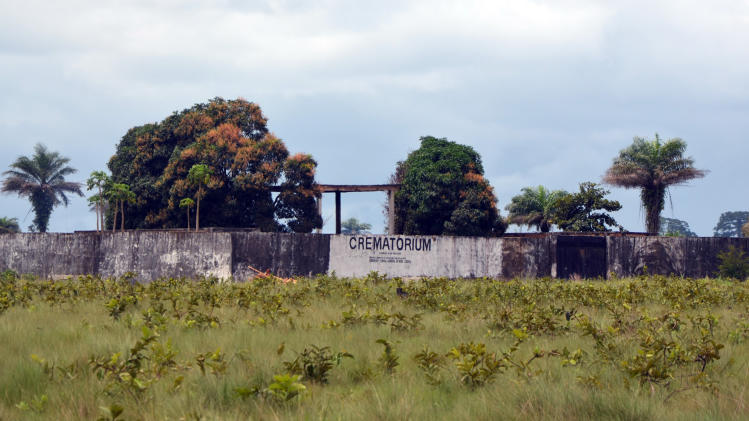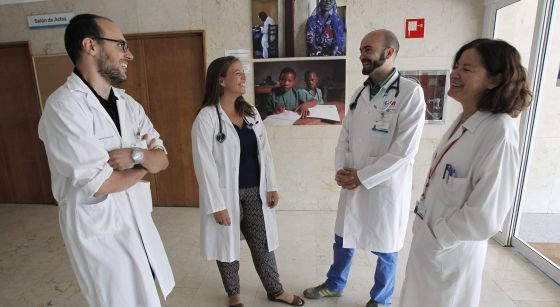y Tami Hultman
Washington, DC — Imagine
this choice. Your child has Ebola symptoms. You have no protective
gloves to help keep you alive to care for her. But she needs comfort, so
you wash her and wipe away her vomit – and you both die.
Liberia, one of the three most-affected countries, doesn't have
enough gloves even for medical staff. Overwhelmed international
caregivers – like the uniquely engaged Médecins Sans Frontières/Doctors
Without Borders (MSF) – are expressing disbelief at the 'too little, too
late' international response.
"We are completely amazed by the lack of willingness and
professionalism and coordination to tackle this epidemic," the group's
operations director, Brice de le Vingne, told the
Financial Times,
saying Liberia, where MSF is scaling up treatment centers, is a country
on the verge of collapse. "We have been screaming for months," he said.
The group says there is nowhere near the assistance needed, despite
recent efforts. Only after a traveler from Liberia took the virus to
oil-rich Nigeria, Africa's most populous nation and host to large
international investments and businesses, did the global response reach
even the current modest levels.
The
World Health Organization this month is launching a U.S. $100 million disaster plan, after exhausting previous contributions of $7 million. The U.S.
Centers for Disease Control
(CDC) has sent 19 people to work in Liberia, and Public Affairs
Director Barbara Reynolds says at least 60 CDC people are in Liberia,
Guinea and Sierra Leone, plus Nigeria.
Nobody who has been working on the Ebola crisis in Guinea, Sierra Leone or Liberia thinks that's close to what's needed.
Contrast that with the world response to the 2010 Haitian earthquake.
Over $3.5 billion was donated by governments, organizations and
individuals. Within 24 hours, the small nation of Israel had equipped a
plane with emergency medical supplies,
and 40 doctors and 20 nurses and 20 medics were able to set up a field
hospital on arrival – including a patient identification system and
electronic medical records. More than 300 CDC staff went to Haiti to
assist in the recovery, including battling the ensuing cholera epidemic.
In much of North America, Latin America and Europe, commercial
businesses put out collection boxes for relief donations. Individuals
responded massively.
Nothing like that is in place for west Africa.
"The virus has devastated the entire health infrastructure of the country," says Riva Levinson, whose Washington,DC-based
KRL International
works with the government of Liberia to get its message out. That means
Liberians are dying in large numbers every day from easily treated but
common diseases in one of the world's poorest countries routine
gastrointestinal infections, pneumonia, complications of pregnancy, and
malaria – which is at its highest levels in the current rainy season –
due to the absence of care. [See AllAfrica's
Bokai Fofana's blog about the heightened worry about finding treatment when his young son developed malaria.
Clinics and hospitals have closed, not only from losses of staff but
from for lack of infection control supplies and disinfectant to make
buildings and wards safe for caregivers or other patients following
treatment of Ebola sufferers. That lack of capacity forced Dr. James
Sirleaf, medical director of the medical assistance group
Heartt Foundation,
to pull its volunteers out of John F. Kennedy Hospital (JFK) in
Monrovia, the country's main teaching and referral facility. "It was an
agonizing decision," he said.
Heartt has formed ties with at least 19 major U.S. medical schools
and universities and has a program that takes volunteers to JFK on short
rotations to teach medical students and other health professionals
while providing patient care. Last month the epidemic claimed JFK's top
medical consultant, Dr. Samuel Brisbane.
Dozens of health workers have died, in a country that – before Ebola
struck – only had around 50 doctors for a population of over four
million. AllAfrica's Patience Dalieh's cousin, a nurse, died last week,
after treating patients in a cross-roads market town of Kakata, in
central Liberia; eleven other nurses in the facility died. (Patience
didn't let fear stop her from trying to prevent Ebola's spread in
Monrovia, Liberia's capital. See
her blog.)
On Friday, in a rare bit of good news for Liberia, Dr. Phillip
Ireland, who was treated at the same Ebola treatment center as Brisbane,
walked out of the center, arms raised as he greeted family and
supporters.
Heartt's Sirleaf first met Ireland when the then-medical student
approached him for help in augmenting his emergency medicine skills.
"When I heard he had contracted Ebola, I cried," says Sirleaf. "His
recovery is wonderful news!"
But there is little good news for the country that already was
struggling to recover from a quarter century of conflict that killed
250,000 people and dislocated three-quarters of the population, while
destroying almost all the infrastructure – clinics, schools, roads,
bridges and public buildings. The administration of President Ellen
Johnson Sirleaf has been battling to rebuild, and there were clear signs
of recovery against the odds. [See
Briefing: Moving From Stabilization to Transformation]
.Now, much of that hard-won progress has been erased – and is
threatened with reversal. Schools have closed, Peace Corps teachers have
left, companies working on critical development projects have withdrawn
staff. The government announced that essential work on dams and roads
has stopped.
Without strong intervention, widespread famine looms. In-country
trade in agricultural products has ground to a standstill, and essential
grain and rice shipments, as well as imports of fuel for electric
generators has slowed, as ships bypass the Port of Monrovia. All but two
airlines – as of this writing, Brussels Air and Royal Air Maroc were
still flying – have halted service to Monrovia.
What's desperately needed, says Levinson, is a global response on the
model of the assistance for Haiti. "If we don't recognize that we need
to fight Ebola and contain it in a big way and provide the countries
with support, we're not going to be capable of arresting it. And right
now the support is not even scratching the surface."
"In Haiti, everyone wanted to go there and volunteer," she says. "The
challenge now is the level of fear. The focus has been on preventing
the disease 'coming to us', and it has completely missed the devastation
it has caused."
Blaming the Victims
Much of the early warnings about Ebola came from policy experts who
pinned responsibility for the slow response on the governments of the
three countries – and media reflected that view.
Former National Public Radio reporter Laurie Garret - author of The
Coming Plague, which warns about emerging diseases such as Ebola – is
now senior fellow for global health at the Council on Foreign Relations.
In an
opinion piece for CNN, she gives a nod to the history of regional conflict, but puts the blame squarely on poor governance:
"Fear, suspicion, poverty, pain and superstition are the norm, the
noise that everybody lives with, every minute of their lives. Ebola is
simply a new scream heard above that terrible background din. The
challenge today in these barely functioning states is to find ways to
lower the overall noise, focus on stopping the Ebola virus, and bring
governance and peace to three countries that have rarely experienced
either.
Garret's position was widely echoed in other media and by other
pundits during the critical period for containing the virus and
minimizing the loss of life and the long-term economic catastrophe. The
failure of the international organizations that had the scientific
expertise to warn African governments and advise them on effective
mitigation received little scrutiny.
A New York Times
editorial on 15 August
citing a "painfully slow" international response was an important
corrective to the 'blame the victim' narrative, saying the World Health
Organization had "snoozed on the sidelines for months" and commending
the heroic efforts of MSF and Samaritan's Purse.
Two intrepid media professionals, photojournalist
John Moore of Getty and reporter
Jina Moore of Buzzfeed
have been posting heart-wrenching images and stories – a key component
to mobilizing public pressure for political action. National Public
Radio has a team in Liberia this week.
Levinson and other advocates for the affected countries would like to
see former American Presidents Clinton and Bush, who established the
Clinton Bush Haiti Fund
take similar action on behalf of Ebola victims and to stimulate more
helpful media coverage of the needs in Liberia, Sierra Leone and Guinea.
She says it can't be soon enough.
"All of the governments are democratically elected, all post-conflict
success stories, all inherited non-existent infrastructures that had to
be re-built from close to zero. With so much to lose, what is the world
waiting for?"
The AllAfrica Foundation is launching this week a Give a Glove
campaign – to call attention to the need for international action and to
support the Ebola BlockAID campaign of the Heartt Foundation. Watch for
information.http://allafrica.com/stories/201408201797.html?viewall=1







